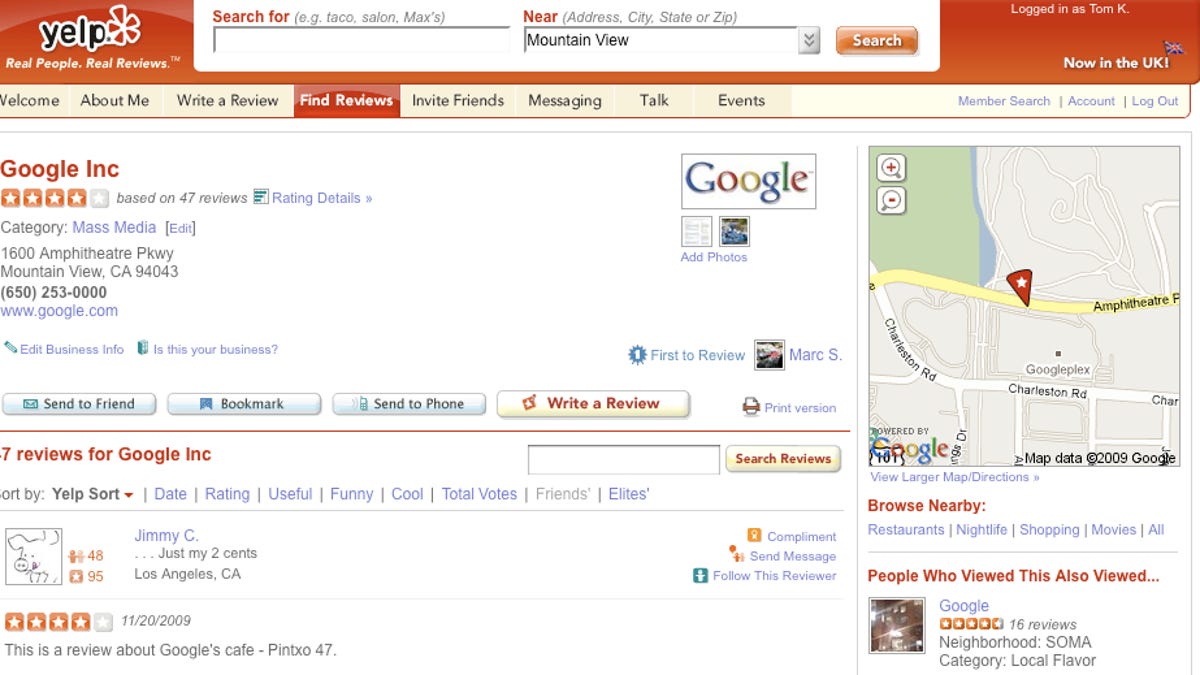Why Google may want Yelp
Expect mostly positive reviews of Google's potential interest in Yelp, one of the best sources of information about local businesses on the Internet.

Online reviews powerhouse Yelp might just be what Google needs to help rid the world of 40-pound tomes with yellow pages.
Throughout the second half of 2009, Google has had its eyes squarely on one of the last remaining online advertising markets it does not dominate: local. With a series of moves, Google has shown a clear interest in combining Google Maps, search results, and its small-business-oriented advertising technology into its next big source of revenue growth as offline local businesses come online.
However, Google management seems to have decided to step up the pace. TechCrunch and the New York Times reported overnight that Google is in discussions to acquire Yelp for $500 million or more. Yelp has grown into a huge destination for those looking for new places to have fun, turning it into one of the more pervasive brands among the digerati.
And it's not just bars and restaurants anymore: dentists, churches, and top-notch local golf instructors can be found on Yelp. That makes the site a huge repository of locally sorted data on how people are spending money, and that's the kind of thing that gets Google and its advertisers excited.
"We want to make search a way to discover things that are interesting about a place. A big interest of ours is helping you get to a place and also helping you identify what is interesting about the place when you're choosing one," said Carter Maslan, director of product management at Google and overseer of all things local. Maslan declined to comment on the reports about Yelp (as did Yelp itself) but he was more than happy to talk about the huge opportunity that Google sees in local search.
Local business listings have been available on Google since 2005 through the Local Business Center, which allows business owners to essentially claim their establishment on Google and add basic information such as their phone number, hours of operation, and a link to their Web site.
That operation has been expanded in 2009. Over the summer Google asked a list of celebrities to name their "favorite places" as part of a promotion for a Google Maps feature that lets users identify local businesses they enjoy. For instance, Kerri Walsh, the gold-medal winning volleyball player, added her thoughts to listing pages for Lake Tahoe's Lone Eagle Grill and the Pump Room at Chicago's Ambassador East Hotel, spotlighting two local businesses that aren't necessarily on the national radar.
Google followed that up by launching Place Pages, which the company described as "a web page for every place in the world" when launching the service. Place Pages are very Yelp-like in their design. They feature reviews, photos, and, of course, ads--far more than could be crammed into a simple listing.
Location, location, location
Just last week Google unveiled plans to send local businesses decals declaring "We're a Favorite Place on Google!" That's a clear nod to Yelp's strategy of handing out similar decals to business owners, although Google took it a step further by adding unique codes that could be scanned by mobile phones to bring up additional information about the business.
The motivation behind Google's recent moves and its possible acquisition of Yelp is simple. The number is squishy, but Google estimates that anywhere from 15 percent of 40 percent of all search queries have some sort of local intent. A large number of those searches are also done from mobile phones, a number that will only grow larger as sales of the devices themselves continue to grow. And, of course, maps are required to find local businesses.
That gives Google three ways to target someone looking for local information. They'll see an ad on the search results page for a local query. They'll see an ad on the Place Page for that business, which might soon be more attractive with Yelp content. And they'll see listings and ads on Google Maps when they try to find directions to that business, which might alert them to nearby businesse--which starts the cycle anew.
And to top it all off, there are still a ton of small businesses that have yet to build out a presence on the Web, giving Google an opportunity to capture that content itself by providing listings and Place Pages for small-business owners that don't want to deal with maintaining their own Web site. This is true "long tail" content, in that demand for any one search result is relatively small but it's almost impossible to estimate how many results will exist over time.
Yelp's unique brand of user-generated content would fit very nicely into that equation. However, owning Yelp would also expose Google to some of the more controversial aspects of Yelp's strong local presence, such as allegations of intimidation and pay-for-play reviews. Yelp has denied the charges, but given Google's position under the antitrust microscope, any sort of extra scrutiny will not be appreciated.
At around $500 million, Yelp would be one of Google's largest acquisitions to date and its second major deal since CEO Eric Schmidt announced the company was once again in shopping mode. Even if the deal falls through, it's a clear sign of the company's interest in expanding its online advertising empire to the local market.
But it's perhaps also a sign that Google realized it needed a little help in getting there. After all, every decision about expanding a business comes down to build versus buy. Sometimes it's just easier to write a check.